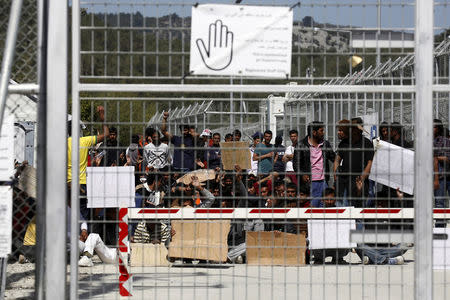In Greek camps, wait for asylum fuels unrest
By Karolina Tagaris ATHENS (Reuters) - Tents were set on fire, punches were thrown, children cried through the night and families were forced to flee the burning detention camp and sleep in open fields. The tension is palpable on Greece's islands, where about 8,000 asylum seekers feel stranded by a European Union deal with Turkey to stem the arrival of refugees and other migrants on European shores from Syria, Iraq, Afghanistan and beyond. The deal, hailed a success by its European architects, prevents migrants from going beyond Greece - or even its islands - in their search for a new home in Europe, until their asylum claims are processed and those rejected are sent back to Turkey, from where they arrived. But some European officials say the assessment has been slow, and the wait long for those confined to often overcrowded camps. In June, the most violent month yet, dozens were injured in clashes on three islands, police said. Videos in Greek media showed clouds of smoke rising over the centres on three occasions. In clashes on Lesbos the night of June 1-2, families with young children had to flee and spend the night in nearby fields or Mytilene town, several kilometres away, Amnesty International said. Many returned to burned down tents and destroyed belongings. Women told Amnesty they "live in constant fear" in camps where fights break out in food queues. Journalists are barred from entering the camps on the islands. But humanitarian organisations and police officials on the ground speak of people on edge. "They're reacting. They want to leave the islands," said a police official for the northern Aegean region which includes the islands of Lesbos, Samos and Chios where rival migrant groups brawled. "We're bracing for all eventualities." Rumours and a lack of information and legal help made things worse, said Giorgos Kosmopoulos, an Amnesty International researcher and former Greece director. Non-Syrians said they were not given priority and felt neglected, he said. "People are left wondering 'what's happening with my application, when will I get an answer, what's going on?'" he said. PROGRESS? Since the EU-Turkey accord was agreed in March, nearly 500 people have been ferried back to Turkey, but none of those who had requested asylum were among them, Greece says. Meanwhile, nearly everyone currently on the islands has expressed an interest in applying. The process - which includes thorough identity checks, interviews and an assessment of whether Turkey is safe or not for a particular individual - can take weeks. Applicants can appeal a negative decision, prolonging the procedure. "It is important to recognise that these procedures do take time," said Boris Cheshirkov, a spokesman for the United Nations refugee agency on Lesbos, the gateway into Europe for nearly a million people last year. Greece, also mired in its worst economic crisis in generations, says it is doing its best to accelerate the process but insists each case must be given the attention it requires. "It's a sensitive procedure, it's complicated, we make sure we strictly follow the rules," said the government's spokesman for the migration crisis, Giorgos Kyritsis. So far, 726 cases have been heard and 519 of those have been deemed eligible to apply for asylum in Greece, Kyritsis said, while the remaining 207 can appeal the decision. Despite its intention to process all cases, Greece lacks the manpower to deal with the volume of applications. It says it needs more help from EU institutions. As many as 6,656 people applied for asylum in March and April this year, up from 1,899 in those months last year. Even if it could hire more people, they would need to be highly qualified legal experts, government officials say. Brussels acknowledges the process should be in line with international humanitarian law but EU officials and diplomats are pressing Greece to speed things up. "We have been telling Greece and will say it again that the vast majority of EU member states consider Turkey a safe country for Syrians to be returned to," one EU diplomat said. Beyond the claims made on its islands, Greece must process claims of some 48,000 refugees and migrants stranded on the mainland by the closure of Balkan borders, which shut the main overland route used last year by migrants headed for Germany. Those at the frontier are eligible for an EU relocation scheme intended to help frontline countries Greece and Italy share the burden, but it too has been moving slowly. "We're trying for the best, and we're improving," Kyritsis, the migration spokesman, said. (Additional reporting by Gabriela Baczynska in Brussels; editing by Peter Graff)

 Yahoo News
Yahoo News 



